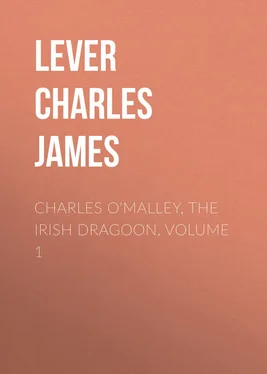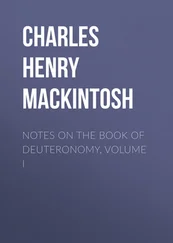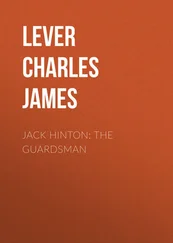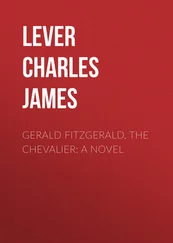Charles Lever - Charles O'Malley, The Irish Dragoon, Volume 1
Здесь есть возможность читать онлайн «Charles Lever - Charles O'Malley, The Irish Dragoon, Volume 1» — ознакомительный отрывок электронной книги совершенно бесплатно, а после прочтения отрывка купить полную версию. В некоторых случаях можно слушать аудио, скачать через торрент в формате fb2 и присутствует краткое содержание. Издательство: Иностранный паблик, Жанр: literature_19, foreign_antique, foreign_prose, на английском языке. Описание произведения, (предисловие) а так же отзывы посетителей доступны на портале библиотеки ЛибКат.
- Название:Charles O'Malley, The Irish Dragoon, Volume 1
- Автор:
- Издательство:Иностранный паблик
- Жанр:
- Год:неизвестен
- ISBN:нет данных
- Рейтинг книги:4 / 5. Голосов: 1
-
Избранное:Добавить в избранное
- Отзывы:
-
Ваша оценка:
- 80
- 1
- 2
- 3
- 4
- 5
Charles O'Malley, The Irish Dragoon, Volume 1: краткое содержание, описание и аннотация
Предлагаем к чтению аннотацию, описание, краткое содержание или предисловие (зависит от того, что написал сам автор книги «Charles O'Malley, The Irish Dragoon, Volume 1»). Если вы не нашли необходимую информацию о книге — напишите в комментариях, мы постараемся отыскать её.
Charles O'Malley, The Irish Dragoon, Volume 1 — читать онлайн ознакомительный отрывок
Ниже представлен текст книги, разбитый по страницам. Система сохранения места последней прочитанной страницы, позволяет с удобством читать онлайн бесплатно книгу «Charles O'Malley, The Irish Dragoon, Volume 1», без необходимости каждый раз заново искать на чём Вы остановились. Поставьте закладку, и сможете в любой момент перейти на страницу, на которой закончили чтение.
Интервал:
Закладка:
Such were the scattered links of conversation I was condemned to listen to, till a general rise on the part of the ladies left us alone to discuss our wine and enter in good earnest upon the more serious duties of the evening.
Scarcely was the door closed when one of the company, seizing the bell-rope, said, “With your leave, Blake, we’ll have the ‘dew’ now.”
“Good claret, – no better,” said another; “but it sits mighty cold on the stomach.”
“There’s nothing like the groceries, after all, – eh, Sir George?” said an old Galway squire to the English general, who acceded to the fact, which he understood in a very different sense.
“Oh, punch, you are my darlin’,” hummed another, as a large, square, half-gallon decanter of whiskey was placed on the table, the various decanters of wine being now ignominiously sent down to the end of the board without any evidence of regret on any face save Sir George Dashwood’s, who mixed his tumbler with a very rebellious conscience.
Whatever were the noise and clamor of the company before, they were nothing to what now ensued. As one party were discussing the approaching contest, another was planning a steeple-chase, while two individuals, unhappily removed from each other the entire length of the table, were what is called “challenging each other’s effects” in a very remarkable manner, – the process so styled being an exchange of property, when each party, setting an imaginary value upon some article, barters it for another, the amount of boot paid and received being determined by a third person, who is the umpire. Thus a gold breast-pin was swopped, as the phrase is, against a horse; then a pair of boots, then a Kerry bull, etc., – every imaginable species of property coming into the market. Sometimes, as matters of very dubious value turned up, great laughter was the result. In this very national pastime, a Mr. Miles Bodkin, a noted fire-eater of the west, was a great proficient; and it is said he once so completely succeeded in despoiling an uninitiated hand, that after winning in succession his horse, gig, harness, etc., he proceeded seriatim to his watch, ring, clothes, and portmanteau, and actually concluded by winning all he possessed, and kindly lent him a card-cloth to cover him on his way to the hotel. His success on the present occasion was considerable, and his spirits proportionate. The decanter had thrice been replenished, and the flushed faces and thickened utterance of the guests evinced that from the cold properties of the claret there was but little to dread. As for Mr. Bodkin, his manner was incapable of any higher flight, when under the influence of whiskey, than what it evinced on common occasions; and as he sat at the end of the table fronting Mr. Blake, he assumed all the dignity of the ruler of the feast, with an energy no one seemed disposed to question. In answer to some observations of Sir George, he was led into something like an oration upon the peculiar excellences of his native country, which ended in a declaration that there was nothing like Galway.
“Why don’t you give us a song, Miles? And may be the general would learn more from it than all your speech-making.”
“To be sure,” cried the several voices together, – “to be sure; let us hear the ‘Man for Galway’!”
Sir George having joined most warmly in the request, Mr. Bodkin filled up his glass to the brim, bespoke a chorus to his chant, and clearing his voice with a deep hem, began the following ditty, to the air which Moore has since rendered immortal by the beautiful song, “Wreath the Bowl,” etc. And, although the words are well known in the west, for the information of less-favored regions, I here transcribe —
To drink a toast,
A proctor roast,
Or bailiff as the case is;
To kiss your wife,
Or take your life
At ten or fifteen paces;
To keep game-cocks, to hunt the fox,
To drink in punch the Solway,
With debts galore, but fun far more, —
Oh, that’s “the man for Galway.”
CHORUS: With debts, etc.
The King of Oude
Is mighty proud,
And so were onst the Caysars ;
But ould Giles Eyre
Would make them stare,
Av he had them with the Blazers.
To the devil I fling – ould Runjeet Sing,
He’s only a prince in a small way,
And knows nothing at all of a six-foot wall;
Oh, he’d never “do for Galway.”
CHORUS: With debts, etc.
Ye think the Blakes
Are no “great shakes;”
They’re all his blood relations.
And the Bodkins sneeze
At the grim Chinese,
For they come from the Phenaycians .
So fill the brim, and here’s to him
Who’d drink in punch the Solway,
With debts galore, but fun far more, —
Oh, that’s “the man for Galway.”
CHORUS: With debts, etc.
I much fear that the reception of this very classic ode would not be as favorable in general companies as it was on the occasion I first heard it; for certainly the applause was almost deafening, and even Sir George, the defects of whose English education left some of the allusions out of his reach, was highly amused, and laughed heartily.
The conversation once more reverted to the election; and although I was too far from those who seemed best informed on the matter to hear much, I could catch enough to discover that the feeling was a confident one. This was gratifying to me, as I had some scruples about my so long neglecting my uncle’s cause.
“We have Scariff to a man,” said Bodkin.
“And Mosey’s tenantry,” said another. “I swear, though there’s not a freehold registered on the estate, that they’ll vote, every mother’s son of them, or devil a stone of the court-house they’ll leave standing on another.”
“And may the Lord look to the returning officer!” said a third, throwing up his eyes.
“Mosey’s tenantry are droll boys; and like their landlord, more by token, they never pay any rent.”
“And what for shouldn’t they vote?” said a dry-looking little old fellow in a red waistcoat; “when I was the dead agent – ”
“The dead agent!” interrupted Sir George, with a start.
“Just so,” said the old fellow, pulling down his spectacles from his forehead, and casting a half-angry look at Sir George, for what he had suspected to be a doubt of his veracity.
“The general does not know, may be, what that is,” said some one.
“You have just anticipated me,” said Sir George; “I really am in most profound ignorance.”
“It is the dead agent,” says Mr. Blake, “who always provides substitutes for any voters that may have died since the last election. A very important fact in statistics may thus be gathered from the poll-books of this county, which proves it to be the healthiest part of Europe, – a freeholder has not died in it for the last fifty years.”
“The ‘Kiltopher boys’ won’t come this time; they say there’s no use trying to vote when so many were transported last assizes for perjury.”
“They’re poor-spirited creatures,” said another.
“Not they, – they are as decent boys as any we have; they’re willing to wreck the town for fifty shillings’ worth of spirits. Besides, if they don’t vote for the county, they will for the borough.”
This declaration seemed to restore these interesting individuals to favor; and now all attention was turned towards Bodkin, who was detailing the plan of a grand attack upon the polling-booths, to be headed by himself. By this time, all the prudence and guardedness of the party had given way; whiskey was in the ascendant, and every bold stroke of election policy, every cunning artifice, every ingenious device, was detailed and applauded in a manner which proved that self-respect was not the inevitable gift of “mountain dew.”
Читать дальшеИнтервал:
Закладка:
Похожие книги на «Charles O'Malley, The Irish Dragoon, Volume 1»
Представляем Вашему вниманию похожие книги на «Charles O'Malley, The Irish Dragoon, Volume 1» списком для выбора. Мы отобрали схожую по названию и смыслу литературу в надежде предоставить читателям больше вариантов отыскать новые, интересные, ещё непрочитанные произведения.
Обсуждение, отзывы о книге «Charles O'Malley, The Irish Dragoon, Volume 1» и просто собственные мнения читателей. Оставьте ваши комментарии, напишите, что Вы думаете о произведении, его смысле или главных героях. Укажите что конкретно понравилось, а что нет, и почему Вы так считаете.












